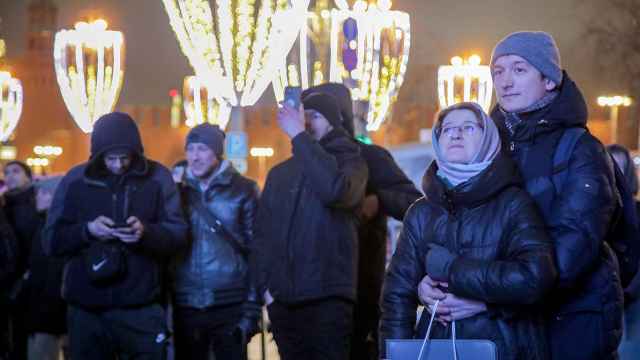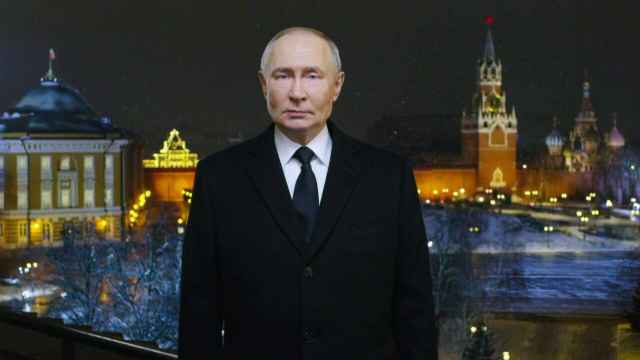The auto market grew by 30 percent last year to 1.91 million units, rebounding after an initial slump and leaving it poised to reach pre-crisis sales levels by 2012.
Earlier gloomy forecasts for 2010 foresaw sales of only 1.5 million units, said the Association of European Businesses' Automobile Manufacturers Committee at its annual news conference Thursday.
“The recovery has been driven by general consumer confidence, a stable currency and availability of credit as the year went forward,” said Volvo Russia president and committee chairman David Thomas.
The committee, which represents 25 auto companies making 40 car brands for the Russian market, calculated that 1.47 million cars and light commercial vehicles were sold in 2009.
Sales fell by 7 percent in the first quarter, but returned to growth and steadily increased in the last three quarters of 2010. Growth for December amounted to 60 percent versus the same period a year earlier. Russia could soon overtake Germany as Europe’s largest auto market.
Nine out of the 10 bestselling cars were models produced in Russia, with AvtoVAZ's Lada brand leading the way. The Tolyatti-based carmaker sold 517,147 units in 2010, and four of its models — the 2105/2107, Priora, Kalina and Samara, in descending order — were the top sellers.
Sales of the 2105/2107 more than doubled on the back of a cash-for-clunkers scheme the government introduced to support domestic car manufacturers in the midst of the economic crisis.
Prime Minister Vladimir Putin said in December that the government will spend about 17 billion rubles ($555 million) in 2011 supporting the domestic auto industry, including 3.5 billion rubles for the cash-for-clunkers program and 2.8 billion rubles to subsidize car loans.
The Ford Focus was the most popular foreign-branded model, with 67,041 sold. General Motors' Chevrolet remained the most popular foreign brand, with 116,233 vehicles of various models sold in 2010.
Korean brand Kia took third place, selling 29,165 units of its mid-range Rio — nearly three times more than in 2009.
The unexpected burst of growth puts the Russian market well on its way to its pre-crisis sales figures. Thomas cautiously guessed that the sales would return to 2008 levels of 2.8 million to 2.9 million units “probably in 2012,” but asked journalists “not to write that in blood.”
“Continued growth will depend on a stable currency, low interest rates and continued consumer confidence,” he said. Those factors, in turn, will largely depend on the global economic environment, because of sensitivity to commodities prices, he added.
On the back of this year's growth the committee predicts sales of 2.24 million units in 2011, just over 2 million of which will be cars.
The predictions jibe with forecasts by the Avtostat analytical agency of 2.5 million cars and light commercial vehicles in 2011, including up to 2.35 million cars.
Auto executives are planning accordingly. “Toyota sold just over 79,000 last year, and this year we're expecting about 115,000,” said Dirk De Man, senior director for Toyota and Lexus brands at Toyota Motor Russia.
Many manufacturers are focusing on smaller categories of cars, like Class C (small family cars), and Class B (small cars). “We're expecting growth in all sectors, perhaps with a predominance in Class C and B,” said Sergei Lepnukhov, director of communications at General Motors. Lepnukhov expects much of GM's future success to come from two new C-segment models, the Opel Astra and the Chevrolet Cruze. “Demand for these is so high we do not have the capacity to meet it.”
Earlier this week AvtoVAZ, and its partners Renault and Nissan, announced plans to develop a Class C Lada. The new car, which will be based on the Nissan Almera Classic, is expected to be brought to market in 2015 to 2016, Vedomosti reported.
Car manufacturers are bracing themselves for an explosion of used car dealerships, as a glut of cars sold in the 2005-08 boom years return to the market as second hand models.
“Generally Russian consumers change cars every three years. So there's this bulge of used vehicles ready to come back into the market,” Thomas told The Moscow Times. A change in VAT law, which was until recently based on the whole value of a used vehicle rather than the profit margin, has made second-hand car dealerships financially viable, he added.
Editor's note: An earlier version of this article mistakenly gave the name and title of an executive as Dirk le Man, a senior marketing director at Lexus and Toyota. His name and title are Dirk De Man, senior director for Toyota and Lexus brands at Toyota Motor Russia.
A Message from The Moscow Times:
Dear readers,
We are facing unprecedented challenges. Russia's Prosecutor General's Office has designated The Moscow Times as an "undesirable" organization, criminalizing our work and putting our staff at risk of prosecution. This follows our earlier unjust labeling as a "foreign agent."
These actions are direct attempts to silence independent journalism in Russia. The authorities claim our work "discredits the decisions of the Russian leadership." We see things differently: we strive to provide accurate, unbiased reporting on Russia.
We, the journalists of The Moscow Times, refuse to be silenced. But to continue our work, we need your help.
Your support, no matter how small, makes a world of difference. If you can, please support us monthly starting from just $2. It's quick to set up, and every contribution makes a significant impact.
By supporting The Moscow Times, you're defending open, independent journalism in the face of repression. Thank you for standing with us.
Remind me later.






